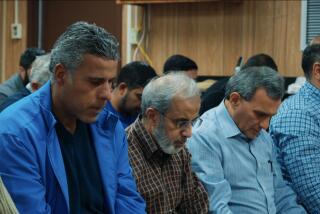Seeing Jesus From a Centuries-Old Muslim Perspective Is Fascinating
- Share via
In a strange variation on Matthew’s Gospel that Christians probably haven’t heard, Jesus declares to his followers: “Truly I say to you, God will not leave one stone of this mosque upon another but will destroy it utterly because of the sins of its people.”
A mosque in 1st century Jerusalem? This saying is found not in any apocryphal gospel but in the Hadith, a vast, centuries-old body of Muslim holy writings. Aside from changing “temple” to “mosque,” the statement also lacks any mention of Jesus’ promise to rebuild it within three days, an allusion to the Resurrection. In Tarif Khalidi’s startling and revelatory “The Muslim Jesus,” one learns that such editing was common among Muslim scholars, who struggled to preserve the valuable--but not the blasphemous--statements of the Galilean preacher in Islamic tradition.
“Jesus is a controversial prophet,” writes Khalidi, an Islamic expert at King’s College, Cambridge. “With Jesus, as with no other prophetic figure, the problem is not only to retell his story accurately. There are major doctrinal difficulties with the Christian version of his life and teachings.”
Jesus captivated the Muslim imagination; in Islam, he is regarded as the last great prophet to precede Muhammad. Khalidi reminds us of the Middle Eastern milieu into which Islam arrived. Under a blazing desert sun, many of the world’s great traditions--Judaism, Christianity, Zoroastrianism--mingled in a vibrant, dynamic atmosphere. The proximity of so many religions bred, along with tolerance, unmistakable signs of each other’s influence.
“What percolated from one community to the other was determined by what each saw as true . . . or edifying in the traditions of the other,” he explains.
For many years, Khalidi engaged in scholarly archeology, poring over the Hadith for any sightings of Jesus. In “The Muslim Jesus,” he presents more than 300 stories and sayings. Here we find a Messiah who often echoes the New Testament, attacking hypocrisy and making mystical declarations, and at other times he seems alien, placed in an Islamic context, discussing the Koran and denying his divinity. Ranging from sentences to fully developed stories, these writings were composed by anonymous sages. They started appearing within 100 years of Muhammad’s death in 632. Khalidi calls his collection “a Muslim gospel.”
“This gospel is the story of a love affair between Islam and Jesus,” he writes. It is “a unique record of how one world religion chose to adapt the central figure of another, coming to recognize him as constitutive of its own identity.”
What “percolated” from Christianity to Islam are the interesting, and sometimes odd, interpolations of the Gospels that Khalidi found. “Place your treasure in heaven for the heart of man is where his treasure is” sounds like the same advice in the New Testament. “Just as kings have left wisdom to you, so you should leave the world to them” echoes the “render unto Caesar” remark that Jesus made to the Pharisees. Such sayings instructed Muslims in piety and good behavior--much as a Christian book on the lives of the saints does--and similar tales abound of Abraham, Moses, David and other biblical figures.
To a people who believed in the indivisibility of Allah, however, Jesus’ shared divinity with a Father and a Holy Spirit was extremely troubling. Believing that his followers misunderstood and distorted his mission, Muslim sages “cleansed” the Jesus stories, resulting in unexpected twists. In a 9th century version of the temptation of Jesus in the desert, for example, Satan taunts him to jump off a mountaintop. Rather than the familiar “You shall not put the Lord your God to the test,” Jesus replies: “God ordered me not to put myself to the test, for I do not know whether He will save me or not.”
Disturbing though they might be for Christian readers, such revisions are also deeply moving. They show the efforts that sages made to claim Jesus as an imam, or spiritual guide. Has Christianity done the same with other creeds? Hardly. Early Islam seems far more accommodating: It found a way of admitting rivals into its pantheon, though the Holy Roman Church could advance only by quashing heresies and establishing a single dogma.
Consider one interesting East-West parallel aided by the book’s chronological format. In a 14th century collection by the lawmaker al-Subki, Jesus is still a cherished figure, instructing Muslims that “the rich shall not enter the kingdom of Heaven.” About the same time, Dante consigned Muhammad to cruel suffering in “Inferno.” We might explain such drastically different treatments by the fact that imperial Islam was flourishing while Western civilization was in turmoil.
Today, with the situation reversed, the value of “The Muslim Jesus” is all the more evident. “Amid the current tensions between Christianity and Islam,” Khalidi writes, “it is salutary to remind ourselves of an age and a tradition when Christianity and Islam were more open to each other, more aware of and reliant on each other’s witness.”
*
Nick Owchar is an assistant editor of Book Review.
More to Read
Sign up for Essential California
The most important California stories and recommendations in your inbox every morning.
You may occasionally receive promotional content from the Los Angeles Times.













